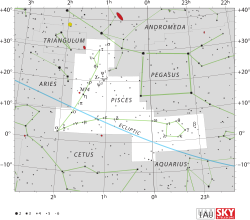うお座カッパ星
うお座κ星(うおざカッパせい、κ Piscium、κ Psc)は、うお座の恒星である[10]。見かけの等級は4.94と条件次第では肉眼でもみえる明るさである[1]。年周視差に基づいて太陽からの距離を計算すると、およそ161光年である[3][注 1]。クロムやストロンチウムが過剰に存在するA型特異星で、珍しいr過程元素も検出されている[11][12]。自転に伴って変光し、りょうけん座α2型変光星にも位置づけられる[13][2]。
| うお座κ星 κ Piscium | ||
|---|---|---|
| 星座 | うお座 | |
| 見かけの等級 (mv) | 4.94[1] (4.87 - 4.95)[2] | |
| 変光星型 | ACV[2] | |
| 位置 元期:J2000.0 | ||
| 赤経 (RA, α) | 23h 26m 55.9558721856s[3] | |
| 赤緯 (Dec, δ) | +01° 15′ 20.177913204″[3] | |
| 視線速度 (Rv) | -4.4 ± 0.6 km/s[3] | |
| 固有運動 (μ) | 赤経: 87.005 ミリ秒/年[3] 赤緯: -95.945 ミリ秒/年[3] | |
| 年周視差 (π) | 20.3145 ± 0.0982ミリ秒[3] (誤差0.5%) | |
| 距離 | 160.6 ± 0.8 光年[注 1] (49.2 ± 0.2 パーセク[注 1]) | |
| 絶対等級 (MV) | 1.45[4] | |
うお座κ星の位置(赤丸)
| ||
| 物理的性質 | ||
| 半径 | 1.78 ± 0.03 R☉[5] | |
| 質量 | 2.07 ± 0.04 M☉[4] | |
| 表面重力 (log g) | 4.2 cgs[6] | |
| 自転速度 | 38.4 ± 1.5 km/s[6] | |
| 自転周期 | 1.409582 ± 0.000066 日[7] | |
| スペクトル分類 | A1 CrSrEu[8] | |
| 光度 | 22.4 ± 2.1 L☉[4] | |
| 有効温度 (Teff) | 9,470 ± 100 K[6] | |
| 色指数 (B-V) | 0.03[1] | |
| 色指数 (U-B) | -0.02[1] | |
| 色指数 (R-I) | -0.03[1] | |
| 金属量[Fe/H] | 0.74[9] | |
| 年齢 | 3.72+1.29 −1.43×108 年[4] | |
| 他のカタログでの名称 | ||
| うお座8番星, BD+00 4998, FK5 884, HD 220825, HIP 115738, HR 8911, SAO 128186[3] | ||
| ■Template (■ノート ■解説) ■Project | ||
外観・名称
編集うお座κ星は、うお座の中で西の魚を表す輝星がかたちづくる「サークレット」と呼ばれるアステリズムの一端を担い、その輪の最も南に位置している[10][14]。南東に約10分離れたところにみえる7等星のうお座9番星と、双眼鏡で簡単にみることができる美しい二重星としてみえているが、この2星に物理的な関係はない[10]。
中国ではうお座κ星は、雨を司り万物を存在せしめると伝えられる雲雨(拼音: )という星官を、うお座12番星、うお座21番星、うお座λ星と共に形成する[15][16]。うお座κ星自身は、雲雨一(拼音: )すなわち雲雨の1番星といわれる[15][16]。
特徴
編集| 太陽 | うお座κ星 |
|---|---|
うお座9番星とは別に、うお座κ星には重星カタログに収録された2つの「伴星」が存在する[17]。重星カタログでは、発見者がジェームズ・サウスとなっているが、ウィリアム・ハーシェルやヴィルヘルム・シュトルーヴェも観測している[17][18]。うお座κ星(A)から北北東におよそ3分離れたところにいる10等星Bと、そこから南東に80秒程のところにいる13等星Cがそれだが、いずれも偶然同じ方向にみえている見かけだけの関係である[17][19][20][10]。
組成
編集うお座κ星は、A型の化学特異星(Ap星)で、スペクトル型はA1 CrSrEuと分類されている[8]。この表記は、A型特異星の中でも、クロム、ストロンチウム、ユウロピウムが特に豊富に存在する一群に属することを示す[11][21]。他に、ケイ素も多く存在しているとされる[22]。また、ウランの吸収線が多数みられ、他にもオスミウムや白金の吸収線も検出されていることから、r過程元素を豊富に含むことが確実で、非常に珍しいホルミウムの可能性が高い吸収線もみつかっており、これらの元素の存在が、うお座κ星の特異星としての大きな特徴である[12]。このような元素の存在は、かつてうお座κ星の近傍で超新星が発生し、その影響を受けていることを示唆する[14]。
変光
編集うお座κ星は、ローウェル天文台の報告により、短い周期で変光していることが示された[23]。周期はおよそ0.58日とされ、その後の観測でも概ねこれと一致する周期が求められ、変光星総合カタログではその周期を採用して0.58525日としている[23][24][2]。変光は、恒星の自転に伴うものと考えられ、りょうけん座α2型変光星に分類されている[24][2]。しかしこの周期は、光度測定の位相網羅性や測定精度に難があり、また、分光観測で吸収線輪郭の時間変化が検出されるが、その変動性は0.58日周期と合わないことから、より綿密な測光観測が行われた[25][26][13]。その結果、分光観測の結果とも整合する変光及び自転の周期は、1.410日と求められた[7]。明るさは、4.87等から4.95等の間で変化するとされるが、光度曲線そのものの振幅は、0.02等級以下である[2][23][25]。
磁場
編集Ap星は一般に強い磁場を持ち、うお座κ星も磁場を持つ恒星と考えられるが、実際の観測では測定誤差以下の磁束密度しか観測されず、弱磁場星とみなされていた[11][24][22]。しかし、適当な磁場の下における星表面の鉄分布の偏りを仮定し、そこから計算した鉄吸収線を、観測された鉄吸収線と照合する実験から、うお座κ星の磁場は、平均磁束密度が2キロガウスと、Ap星として妥当な強さであると考えられるようになった[27][6]。
脚注
編集注釈
編集出典
編集- ^ a b c d e Hoffleit, D.; Warren, W. H., Jr. (1995-11), “Bright Star Catalogue, 5th Revised Ed.”, VizieR On-line Data Catalog: V/50, Bibcode: 1995yCat.5050....0H
- ^ a b c d e f Samus, N. N.; et al. (2009-01), “General Catalogue of Variable Stars”, VizieR On-line Data Catalog: B/gcvs, Bibcode: 2009yCat....102025S
- ^ a b c d e f g h “kap Psc -- alpha2 CVn Variable”. SIMBAD. CDS. 2024年6月6日閲覧。
- ^ a b c d Kochukhov, O.; Bagnulo, S. (2006-05), “Evolutionary state of magnetic chemically peculiar stars”, Astronomy & Astrophysics 450 (2): 763-775, Bibcode: 2006A&A...450..763K, doi:10.1051/0004-6361:20054596
- ^ Perraut, K.; et al. (2020-10), “Benchmarking the fundamental parameters of Ap stars with optical long-baseline interferometric measurements”, Astronomy & Astrophysics 642: A101, Bibcode: 2020A&A...642A.101P, doi:10.1051/0004-6361/202038753
- ^ a b c d Romanovskaya, A. M.; et al. (2021-11), “Fundamental parameters of the Ap-stars GO And, 84 UMa, and κ Psc”, Astronomy & Astrophysics 655: A106, Bibcode: 2021A&A...655A.106R, doi:10.1051/0004-6361/202141740
- ^ a b Piskunov, N.; et al. (1998-04), “Multi-element Doppler imaging of κ Psc”, Contributions of the Astronomical Observatory Skalnate Pleso 27 (3): 482-484, Bibcode: 1998CoSka..27..482P
- ^ a b Renson, P.; Manfroid, J. (2009-05), “Catalogue of Ap, HgMn and Am stars”, Astronomy & Astrophysics 498 (3): 961-966, Bibcode: 2009A&A...498..961R, doi:10.1051/0004-6361/200810788
- ^ Wu, Yue; et al. (2011-01), “Coudé-feed stellar spectral library - atmospheric parameters”, Astronomy & Astrophysics 525: A71, Bibcode: 2011A&A...525A..71W, doi:10.1051/0004-6361/201015014
- ^ a b c d Kaler, James B. (2007年11月9日). “KAPPA PSC (Kappa Piscium)”. Stars. University of Illinois. 2024年6月6日閲覧。
- ^ a b c Galeotti, P.; Lovera, E. (1972), “A spectral analysis of kappa Piscium. I”, Memorie della Societa Astronomica Italiana 43: 759-765, Bibcode: 1972MmSAI..43..759G
- ^ a b Galeotti, Piero (1974-11), “Evidence for r-Process Elements in HR 8911”, Astrophysics & Space Science 31 (1): 193-201, Bibcode: 1974Ap&SS..31..193G, doi:10.1007/BF00642610
- ^ a b Ryabchikova, T. A.; et al. (1996-11), “Surface distribution of chromium on the CP2 star HD 220825 (κ Psc)”, Astronomy Letters 22 (11-12): 917-923, Bibcode: 1996AstL...22..822R
- ^ a b Plotner, Tammy (2007). Vogt, Ken. ed. What's Up 2007: 365 Days of Skywatching. Universe Today. p. 336. ISBN 978-0978221409
- ^ a b “中國古代的星象系統 (69): 璧宿天區” (中国語). AEEA 天文教育資訊網. 國立自然科學博物館 (2006年7月8日). 2024年3月20日閲覧。
- ^ a b Wylie, Alexander (1897). “Part III.—Scientific”. Chinese researches. Shanghai. p. 132
- ^ a b c Mason, Brian D.; et al. (2024-01), “The Washington Visual Double Star Catalog”, VizieR On-line Data Catalog: B/wds, Bibcode: 2024yCat....102026M
- ^ South, James (1826), “Observations of the Apparent Distances and Positions of 458 Double and Triple Stars, Made in the Years 1823, 1824, and 1825; together with a Re-Examination of 36 Stars of the Same Description, the Distances and Positions of Which Were Communicated in a Former Memoir”, Philosophical Transactions of the Royal Society of London 116: 1-391, Bibcode: 1826RSPT..116....1S
- ^ “TYC 578-1213-1 -- Star”. SIMBAD. CDS. 2024年6月6日閲覧。
- ^ “GSC 00578-00438 -- Star”. SIMBAD. CDS. 2024年6月6日閲覧。
- ^ Catalano, F. A.; Leone, F.; Kroll, R. (1998-05), “Near infrared light variations of chemically peculiar stars. The SrCrEu stars”, Astronomy & Astrophysics Supplement Series 129: 463-477, Bibcode: 1998A&AS..129..463C, doi:10.1051/aas:1998199
- ^ a b Glagolevskij, Yu. V.; et al. (2006-10), “Spectroscopic study of the weak magnetic star HD220825-κPsc”, Astrophysics 49 (4): 497-505, Bibcode: 2006Ap.....49..497G, doi:10.1007/s10511-006-0048-5
- ^ a b c Rakos, Karl D. (1962), “Photoelectric investigation of magnetic and spectrum variable stars”, Lowell Observatory Bulletin 5 (12): 227-256, Bibcode: 1962LowOB...5..227R
- ^ a b c Pyper, D. M.; Adelman, S. J. (1983-03), “Spectrophotometry of peculiar B and A stars. XIII. HD 51418, 53 Camelopardalis, 78 Virginis, and Kappa Piscium”, Astronomy & Astrophysics Supplement Series 51: 365-384, Bibcode: 1983A&AS...51..365P
- ^ a b Kreidl, Tobias J.; Schneider, Hartmut (1989-01), “The Rotation Period of the Ap Star HD 220825 (κ Psc)”, Information Bulletin on Variable Stars 3282: 1, Bibcode: 1989IBVS.3282....1K
- ^ Kerschbaum, F.; Maitzen, H. M. (1991-06), “Intermediate band photometry of the CP2-star HD 220825 (κ Psc)”, Astronomy & Astrophysics 246: 346-348, Bibcode: 1991A&A...246..346K
- ^ Kochukhov, O. (2017-01), “Doppler imaging of chemical spots on magnetic Ap/Bp stars. Numerical tests and assessment of systematic errors”, Astronomy & Astrophysics 597: A58, Bibcode: 2017A&A...597A..58K
関連項目
編集外部リンク
編集- “κ Piscium”. alcyone software. 2024年6月6日閲覧。
- “VSX: Detail for kap Psc”. The International Variable Star Index. AAVSO (2013年12月27日). 2024年6月6日閲覧。
- “kappa Psc (kappa Piscium)”. VSNET. 2024年6月6日閲覧。
